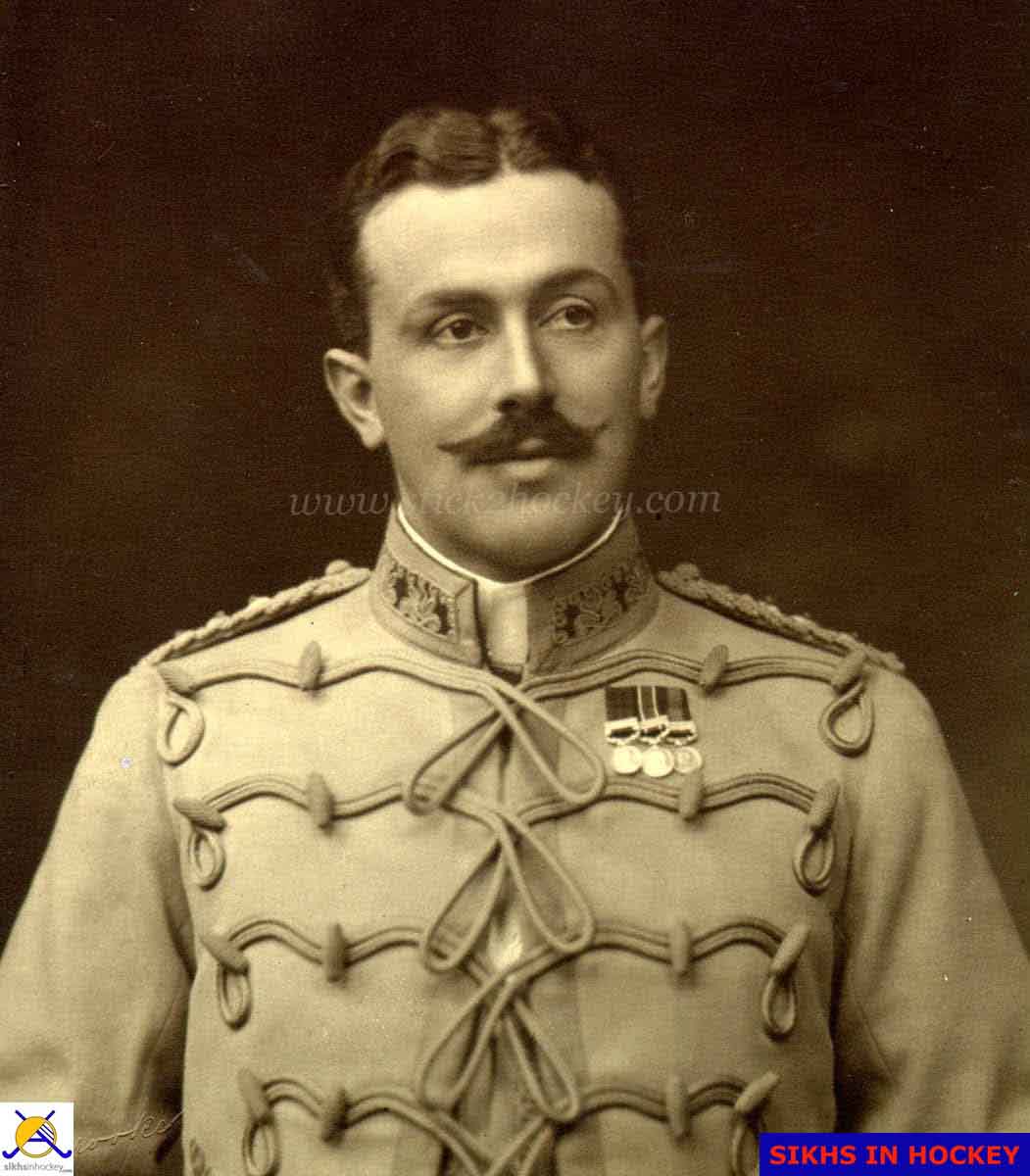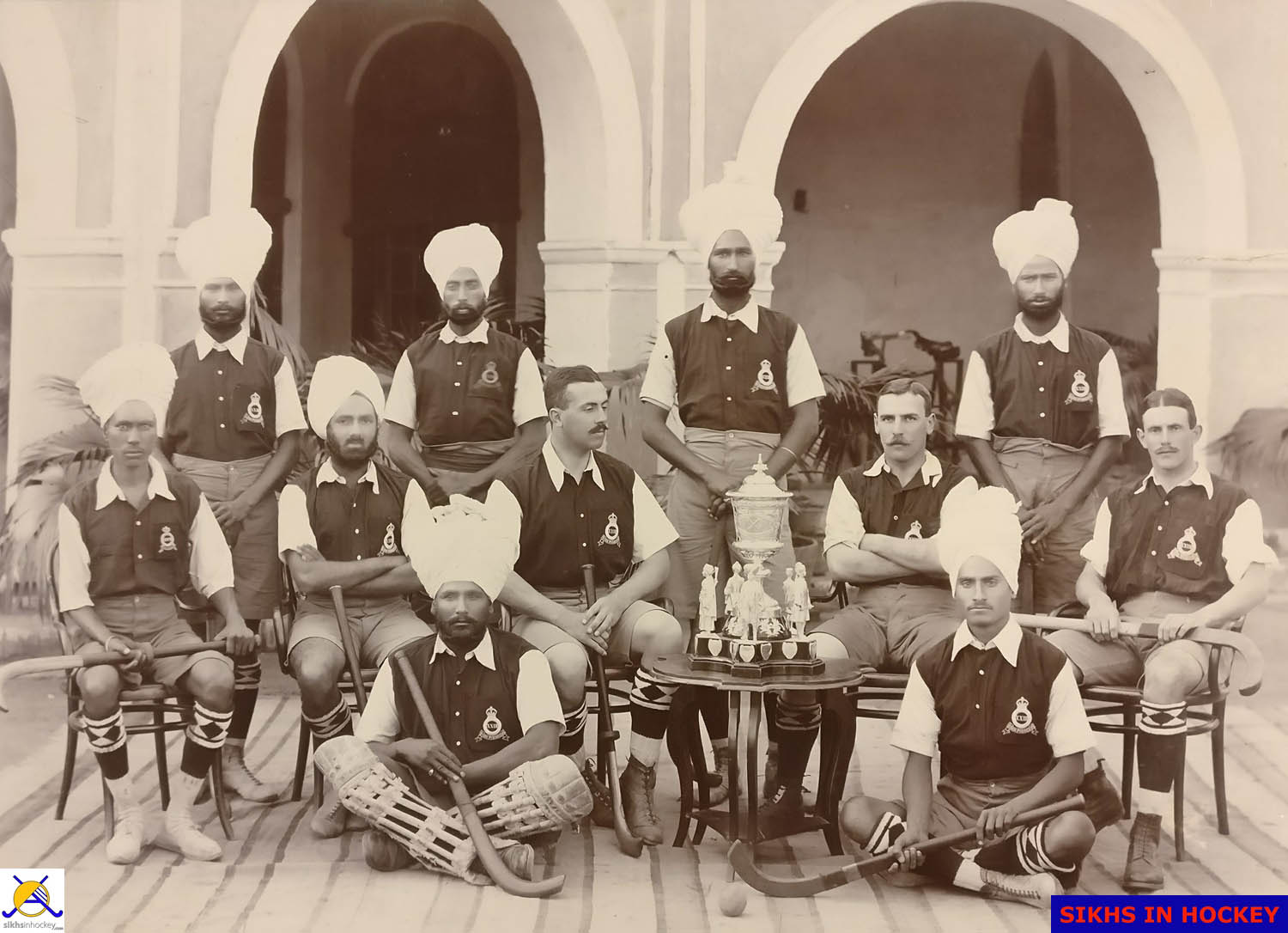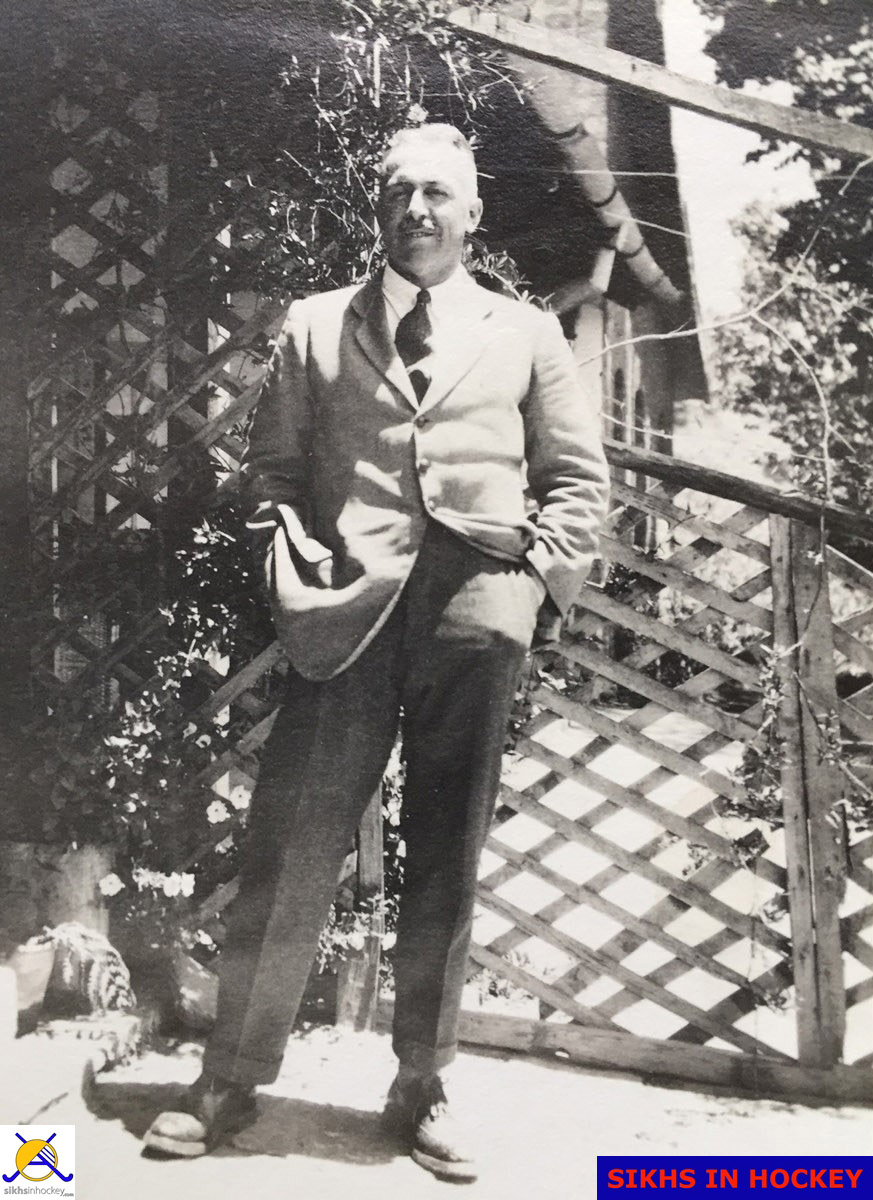The first President of Indian Hockey Colonel Bruce Turnbull – THE SCOT IN THE SIKH PIONEERS
Share
It was a long mystery. Scarcely anybody knew of Col Bruce Turnbull, the first President of the newly formed Indian Hockey Federation (IHF). The formation of the IHF took place 95 years ago and was a turning point in the history of Indian Olympic Movement. Hockey historian and London based Dil Bahra takes us to unknown territory with his usual flair of prose, precise data, pathbreaking information and hitherto unseen images he painstakingly collected during his long research journey.
Bruce Turnbull was born in Khadki (formerly Kirkee) near Pune (formerly Poona), India on November 4, 1880. His father Peter Stephenson Turnbull was Surgeon Major General of the Indian Medical Service in Mumbai (formerly Bombay) in 1893 (also a fellow of the University of Bombay and Surgeon General with the Government of Bombay).

First president of IHF, Col Bruce Turnbull
He was educated at Merchiston Castle School in Edinburgh from 1891 to 1896 where he played rugby and performed gymnastics. He enlisted at Royal Military College, Sandhurst, where he learned to play hockey which was a very popular sport there.
He was gazetted as an Under Officer into the Indian army as a 19-year-old on July 28, 1900.
Turnbull served with the 3rd Battalion of Rifle Brigade in Meerut for a year and on 19 October, 1901, was appointed 2nd Lieutenant in the 23rd Punjab Pioneers.
Seeing active service during the Waziristan campaign in which he did well, Turnbull was awarded the India Medal with the North West Frontier Waziristan 1901-02 clasp. The regiment became the 23rd Sikh Pioneers in 1903 and he experienced active service during the Tibet Mission that year and Colonel Sir Francis Edward Younghusband’s expedition to Lhasa in 1904.
He was awarded the Tibet Medal with clasp and was mentioned in despatches.
The 32nd Sikh Pioneers were also in this campaign and both regiments played hockey during this expedition.

23rd Sikh Pioneers Hockey Team 1904 Bruce Turnbull is seated third from left
Turnbull played hockey for his regimental team and was one of three British officers who were in the 23rd Sikh Pioneers team that won the Punjab Native Army tournament on their return from Tibet to Jhelum in late 1904.
As a British officer in the Indian Army, he passed Urdu and Punjabi language examinations.
He saw active war service on the North West Frontier in 1908 with the 23rd Sikh Pioneers and was promoted to captain on 28 July, 1909. The 23rd Sikh Pioneers were based at Lahore Cantonment on completion of their NW Frontier tour. Turnbull was awarded the Indian General Service Medal 1908 with clasp for North West Frontier 1908. He was part of the 23rd Sikh Pioneers contingent at the Delhi Durbar in December 1911 and he was awarded the Delhi Durbar Medal. He was seconded as Adjutant of the 2nd Battalion, the Bombay, Baroda and Central India Railway Volunteer Rifles in India from January 1912 until 1914.
The Regiment served as mounted rifles and the 2nd Battalion HQ was at Ajmer. He was on leave in the UK at the outbreak of the Great War (WW1) in August 1914. He volunteered his services to the Army and joined the newly raised 7th Service Battalion of the Seaforth Highlanders in Aldershot.
With the arrival of the Indian Army Corps in France at the end of September 1914, he moved to France and joined the 34th Sikh Pioneers (serving with the Lahore Division) on attachment on 14 November, 1914.
Turnbull was transferred to the 107th Bombay Pioneers for a short spell and went on to serve with the 15th and 47th Sikhs in France and Belgium. He was wounded near Festubert in France on 23 November, 1914 when he sustained a gunshot wound to his left jaw which required him to be transferred to a military hospital in the UK. He was with the 47th Sikhs during the second battle of Ypres, Neuve Chapelle in France on 26 April, 1915, where he was badly wounded in the attacks of the Ferozepore and Jullundur Brigades near St Jean. Wounded in the shoulder from a gunshot, Turnbull was admitted to a military hospital in the UK on 30 April, 1915, for a second time in a short spell.

Bruce Turnbull at Staff College Camberley, 1921
He was promoted to major on 1 September, 1915. Having recovered from his wounds at Ypres, on 8 September, 1915, he was appointed Brigade Major of the 202 Infantry Brigade, a training unit based in Kent. He eventually re-joined the 23rd Sikh Pioneers in March 1916 as a Double Company Commander. The Regiment had transferred to Egypt from Somaliland in January 1916. In August 1916 he was appointed Brigade Major 20th Indian Infantry Brigade in Egypt. He spent a short period with the Egyptian Expeditionary Force until May 1917.
He returned to Sialkot, India, in June 1917 and was appointed as second in Command and Wing Commander of the 2nd Battalion, 32nd Sikh Pioneers, a new battalion raised in Sialkot in December 1916. He was mentioned in despatches in the London Gazette of 6 July, 1917.
He was then promoted Temporary Lieutenant Colonel and appointed Commander of the 2nd Battalion, 34th Sikh Pioneers on 2 July, 1917. He commanded the 2nd Battalion, 34th Sikh Pioneers in the North West Frontier in May 1919 during the Third Afghan War. The battalion returned to Sialkot in 1920 prior to disbandment in January 1921. In addition to the 1914 Star, War and victory medals, Turnbull was also awarded the Serbian Order of the White Eagle 5th Class with Swords.
Early in 1920, he went to the UK where he graduated at the Staff College, Camberley, UK in 1921. During this period he played hockey in London and the South East and also umpired hockey regularly during the season.
He then returned to India and re-joined the 23rd Sikh Pioneers on the North West Frontier as Second in Command, engaged in road construction in Waziristan. Turnbull was then awarded the Indian General Service Medal with Waziristan 1921-24 clasp for war services.

Indian Hockey Team at 1928 Amsterdam Olympic Games. Turnbull (5th from left)
He was appointed as Inspector of Physical Training at the Military Training Directorate Army HQ, India on 28 August 1922.
With this post, Turnbull also became the Honorary Secretary of Army Sports Control Boards India. On 3 June, 1923, he was promoted to Colonel. Turnbull was elected as the first President of the IHF on 7 November, 1925. He was on the Rules Board India and Referees’ and Umpires Committee in India.
He was the business manager of the Indian team which won the gold medal at the 1928 Amsterdam Olympic Games. Turnbull officiated at the Games and umpired the bronze medal match between Germany and Belgium.
Turnbull retired from the Indian Army on 20 June, 1926. Returning home to Scotland after his retirement from the Indian Army, he took up a position with the Edinburgh Education Authority in 1928, whilst also the organising secretary for Scotland on the National Playing Fields Association.
He also took command of the 4th/5thBattalion (Queen’s Edinburgh Rifles) The Royal Scots, a Territorial Army Battalion in 1928 and served until 1932. He was then appointed Commander of the 155th (East Scottish) Territorial Brigade in 1932 before finally retiring from the army in 1937.
Turnbull was appointed to the International Hockey Federation (FIH) Council on 23 May, 1928, and served on the Committee until 1932. He also served on the FIH technical committee from 1932 to 1937.
Bruce Turnbull (r) presenting trophy to the winning Edinburgh University team, 1950
Photo 4: Bruce Turnbull (right) presenting trophies to the winning Edinburgh University team in 1950
He was elected President of the Scottish Hockey Association from 1935-37. Turnbull umpired regularly in Scotland, and at the Berlin 1936 Olympic Games he was appointed as a member of the Jury of Appeal and an umpire at the matches.
In 1935 he published the booklet ‘Hockey Hints’.
He was made a Deputy Lieutenant for Edinburgh in 1935 and was honoured with the CBE in 1937. Golf, gardening, and stamp collecting were Turnbull’s favourite pastimes.
Photo 5: Bruce Turnbull at Staff College Camberley in 1921
He remained committed to hockey throughout his life. In 1950 he presented hockey trophies to the winning Edinburgh University team and in 1951 he was the Honorary President at the Scottish Hockey’s silver jubilee celebrations. His unsurpassed knowledge of hockey, both at home and overseas, made him a valuable member of the Rules Board.
He died peacefully at home on 21 January, 1952, in Edinburgh, Scotland.
Author DILJIT SINGH BAHRA sincerely thanks Dr Michael T R B Turnbull, grandson of Colonel Bruce Turnbull; Iain Smith, Editor and Archivist of The Sikh Pioneer and Sikh Light Infantry Association and Dr Tejpal Singh Ralmill of The Sikh Pioneer and Sikh Light Infantry Association for their valuable assistance in writing this document.




This article is informative. Will help immensely any researcher on Indian sports, Indian army. Congratulations to the author. Thank too
Thank You Natarajan
Brilliant research Dil. Gives so much detail of the involvement of Col Bruce, as a soldier, hockey player, administrator and being the first President of IHF. Waiting for the next now.
Thank you Surjit. Comments from an Olympian and a former National Captain are always appreciated
Excellent journey through a momentous past
Thank you N K Kushwaha
It’s long essay. Every minute details are captured. I appreciate the effort whole heartedly, however, I also take this opportunity to make a request. You may shed more light on how he had helped Indian hockey of his times. What was his real time contribution in making Indian team travel to distant Amsterdam etc. Thanks and cheers to you Sir, Shri Diljit Singh Bahra
Thank you for your comments S K Saxena. This story is Part 1 of a series of seven articles leading up to the Amsterdam Olympic Games. That will explain all.
His contribution to the sport as founder president of the national federation is invaluable. Khadki has given many players to Indian hockey. Baby Nimal and Joseph Phillips were part of our team in the Berlin Olympics 1932. In 1952 and 1956 Govind Perumal represented India in the Olympic Games. He hailed from Khadki but played for Tatas in Mumbai. Dhanraj Pillay is a native of Khadki. There was Nimal Jr. from Railways, a nephew of Babu Nimal who represented his country in the Asian Games at Jakarta in 1962. M S Pillay and Alexander came close to playing the Olympics but they had their own status in Indian hockey. Especially M S Pillay who lost out to K D Singh ‘Babu’, the inside forward who led the country in the Olympics in 1952.
Nice of you for all the details Dalvi Ji. MS Pillay is Marudavanam Pillay I suppose – K. Arumugam, Editor, http://www.stick2hockey.com
I thanks you sir, for the exemplary work
Nowadays hockey India has succeeded the IHF. We wish this body too brings laurels to India. This write up is an indepth study. Historical research, useful to present generation.
This article gives 100-year history of Indian hockey. Every hockey lover should read this article.
thank you Prabhu
We got to learn a lot by reading this history and very good
(FIH is mentioned in this articale we want to know, when and ware was it established)
Sagar Hockey, thank you for your comments. The International Hockey Federation (FIH) was founded in Paris on the 7th January 1924. France, Belgium, Austria, Hungary, Czechoslovakia, Spain and Switzerland were the founder members.
Thank you Dil Bahra for your historical insight.
Dhyan Chand’s autobiography, Goal, also references Col. Turnbull, in the context of the abrupt departure of captain Jaipal Singh midway through the 1928 Olympic hockey tournament.
Dhyan Chand mentions that something had happened behind the scenes, and the few people who knew the inside story behind the captain’s departure were manager A. R. Rosser, retd. Major Ricketts, IHF president Major Burn-Murdoch, IHF vice-president Charles Newham and retd. Col. Bruce Turnbull.
Good to hear from you Mr P K Mohan. You are right what you mention. This story is Part 1 of a series of seven articles leading up to the Amsterdam Olympic Games. The events you mention are covered in Part 7 which includes the Amsterdam 1928 Olympic Games in depth, including how the captain was appointed.
I look forward to your 7-part series on the 1928 Amsterdam Olympics. I am sure there will lots of historical nuggets for the sports fan. I am curious to know if the 1928 Indian Olympic team were the first Olympic gold medallists from Asia.
In 1928, Japan won TWO Golds and India one. These were the first Gold medalists from Asia
India won the Gold on 26 May. Japan won on 2 August and 8 August.
Sir, It’s such a brilliant portrayal of the past, nice to read everything.
Thank you for your kind comments Ashish